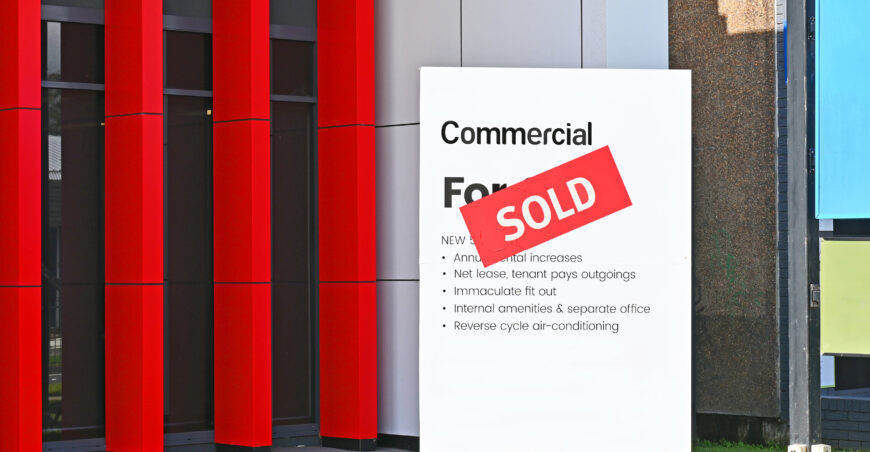A growing number of owner-user’s businesses that both own & occupy their property are choosing to buy commercial real estate instead of lease. For many years, leasing was the natural path for most businesses looking to occupy commercial space. It offered flexibility, lower upfront costs, and the freedom to move on once a lease expired. But in recent years, businesses are choosing to buy instead of lease. This shift isn’t happening by chance; it’s being driven by the financial, strategic, and long-term stability advantages that ownership provides.
Below, we’ll break down why more owner-users are leaning toward ownership and what it could mean for the future of commercial real estate.
1. Building Equity Instead of Paying Rent
When a business leases space, monthly rent payments benefit the landlord. By contrast, owning real estate turns those payments into equity. Every mortgage payment builds long-term value for the business, creating an appreciating asset on the balance sheet.
For many business owners, this has become a powerful tool for wealth-building. Instead of rent disappearing as an expense, ownership creates a form of forced savings. Over time, the property not only retains value but often appreciates, strengthening the financial position of the owner’s business.
2. Greater Control Over the Property When You Buy Commercial Real Estate
Leasing means living within someone else’s rules, whether it’s restrictions on signage, hours of operation, or modifications to the space. Owners have far greater control. They can renovate, expand, or adapt the property to meet the needs of their business without lengthy landlord negotiations.
This flexibility is especially valuable for medical practices, law firms, and other professional service groups where custom buildouts are often required. Instead of negotiating tenant improvement allowances, owner-users can make permanent upgrades that benefit them for decades.
3. Protection Against Rising Rents
Rent escalations are part of nearly every commercial lease. Even modest annual increases can add up quickly, and in markets with high demand, renewal rents can jump significantly.
By purchasing a property, owner-users can lock in predictable long-term costs. Mortgage payments are generally more stable than rent, and once a property is paid off, occupancy costs drop dramatically. This creates a hedge against inflation and unpredictable market cycles, providing stability in budgeting and long-term planning.
4. Tax Benefits and Incentives When You Buy Commercial Real Estate
Commercial property ownership also comes with attractive tax advantages. Owners can often deduct mortgage interest, property taxes, and depreciation, significantly reducing their taxable income.
In addition, programs like the SBA 504 loan are specifically designed to make ownership more accessible for small- and medium-sized businesses. These loans offer lower down payments and competitive fixed interest rates, allowing owner-users to secure financing with less capital out of pocket.
5. Long-Term Business Legacy
For many businesses, especially family-owned companies and professional practices, ownership isn’t just about numbers, it’s about stability and legacy. Owning a building provides a sense of permanence in the community. Patients, clients, and customers see the business as established and invested in the local area.
Beyond reputation, ownership can also play a role in succession planning. When the time comes to retire or transition leadership, the property itself can be sold, leased out, or passed down, creating additional options for wealth transfer.
6. An Investment Beyond the Business
Owner-users often find that their property becomes an investment vehicle beyond daily operations. For example, many medical practices buy larger properties than they need and lease the extra space to complementary tenants. This not only generates rental income but also adds value to the property over time.
This hybrid approach – both occupying and leasing part of a property turns an operational decision into an income-generating investment. It’s one more way ownership creates flexibility and long-term financial rewards.
7. Market Timing and Opportunity
Low interest rates over the past decade sparked much of the owner-user movement, but even in today’s shifting rate environment, ownership remains attractive. That’s because many businesses owners view buying as a long-term play. Market fluctuations may impact short-term affordability, but over 10–20 years, owning commercial real estate still provides a clear advantage compared to escalating lease costs.
Additionally, certain markets like healthcare-driven growth corridors in Arizona’s Southeast Valley offer strong appreciation potential. Owner-users in these areas not only secure space for their operations but also capture value from rising property demand.
The Bottomline When You Buy Commercial Real Estate
Leasing will always have its place, particularly for businesses seeking maximum flexibility or those in rapidly changing industries. But the trend toward businesses that buy commercial real estate rather than lease it is undeniable. More owner-users are recognizing that when they buy commercial real estate instead of lease it, it creates a space that isn’t just a place to run their business, it also becomes a wealth-building strategy, a hedge against uncertainty, and a long-term asset that strengthens their future.
If you’re weighing the decision between if you should lease or if you should buy commercial real estate, it’s worth exploring what ownership could mean for your business – both financially and strategically.
At ICRE Investment Team, we specialize in helping owner-users evaluate opportunities, run the numbers, and find properties that align with their goals. Whether you’re in a medical practice looking to secure a permanent home, a professional firm ready to stop paying rent, or a business planning its next stage of growth, our team can guide you through every step of the process.
















